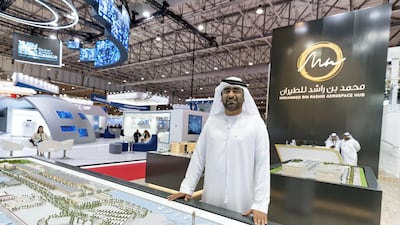The aviation district of Dubai South, a master development that is home to Al Maktoum International Airport, expects to post a 25 per cent rise in revenue next year, as the private jet business surges during the six-month long Expo 2020.
The Mohammed Bin Rashid (MBR) Aerospace Hub, a free zone that caters for aviation services from jet maintenance to research and development, expects to close 2019 with a 20 per cent year-on-rise rise in revenue, Tahnoon Saif, chief executive of MBR Aerospace Hub said in an interview, declining to disclose dollar figures.
"We are working with the relevant authorities to create a unique experience for private jet owners and business people who are coming on private jets," Mr Saif said. "We are expecting to see growth [in passenger traffic]."
Dubai, already a global hub for international travel, along with the private sector invested Dh2.5 billion from a total budget of Dh17bn to develop the MBR Aerospace Hub, which is home to five business jet operators and a VIP terminal. The industry cluster is dedicated to supporting commercial aircraft, private jets; maintenance, repair and overhaul services (MRO), training aviation professionals from pilots to engineers, and offering office space industry players. The project, which is currently 35 per cent finished in terms of infrastructure and facilities, is scheduled to be completed by 2030.
The MBR Aerospace Hub, which counts among its tenants global players such as Boeing, General Electric and Lufthansa Technik, expects to sign up six new customers in 2020, Mr Saif said. It currently houses 20 operators ranging from MRO to private jet firms.
The new clients are expected to collectively bring in investments of Dh1bn between 2020 and 2021 into the Hub.
Occupancy at the aviation free zone varies by type of activity, with the business aviation section now full and the aerospace supply chain area 70 per cent occupied, he said.
Despite a slowdown in the pace of growth at regional carriers against a backdrop of a sluggish global economy, Mr Saif said he is bullish about demand for the services offered by the aerospace cluster.
The lack of a regional aerospace services provider coupled with UAE airlines announcing new aircraft orders at the Dubai Airshow in November are major growth drivers, Mr Saif said. Emirates announced orders for 50 Airbus A350-900 aircraft and restructured orders for Boeing jets while Sharjah-based Air Arabia agreed to buy 100 Airbus A320-family planes.
The last three months also saw announcements of three new airlines setting up in the UAE, which will swell the fleets based in the country and provide growth opportunities for MRO services, Mr Saif said.
European discount specialist Wizz Air is planning a new carrier in Abu Dhabi that will compete with a joint venture between Etihad Airways and Air Arabia, while India's SpiceJet is planning a discount airline in Ras Al Khaimah.
The MBR Aerospace Hub is also building facilities to attract small-and-medium aviation enterprises (SMEs) specialising in avionics or radar systems, for example, to cater to bigger manufacturers, Mr Saif said. Construction of the Dh50 million facility began in the second half of 2019 and will be completed by the first quarter of 2021.
Also in the pipeline is the development of a commercial complex that will bring together firms specialising in aircraft management and charter planes, as well as legal and financial services for the aerospace sector.
While it is focused on MRO and supply chain players, the Hub is also working on bringing in drone manufacturers and securing 3D-printing facilities, Mr Saif said, in line with the UAE's focus on new technologies.


